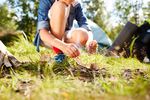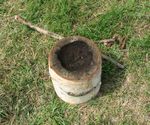SCOUT PROGRAMS 2023 - DUTCHESS COUNTY PARKS
←
→
Page content transcription
If your browser does not render page correctly, please read the page content below
Dutchess County Parks These calsses build upon each
other creating a framework that
Survival/Naturalist programs will allow scouts to handle any
are designed to give Scouts situation that might arise. We
emphasize teamwork, creative
ongoing training in problem solving and self
wilderness survival skills. reliance. As scouts progress
WELCOME SCOUTS
through the classes, they will
learn how to build different types
of shelters , start fires under any
condition, find water and food,
observe nature in detail and feel
comfortable in the woods. The
most important lesson we try to
convey is that even in this
modern world, we are still
interconnected and dependent
on nature in many ways.
Program cost is $5 per scout.
For more information
Email: parknaturalist@dutchessny.gov
or call 845-298-4602.
Facilitators
Dave Beck
Park Naturalist
Jessica Steinbach
Assistant Park NaturalistIntroduction to Archery Ages: 9+
This program is designed for scouts with any level of experience in
archery. We first look at basic archery safety and skills. Then, we
2023 PROGRAM OFFERINGS
2022 PROGRAM OFFERINGS
discuss proper form and ways to improve accuracy. This course is
hands on practicing with bows, and learning through experience.
Exploring the Woods Ages: 5-7
Scouts will hike with a Park Naturalist at Bowdoin or Wilcox Park and
learn about the animals and plants that live in the parks. Scouts will
use their senses to explore the trail and see what nature has for us
to discover. Other topics may include tracking, tree ID, simple plant
ID, animal’s habits, and habitat.
Lostproofing Ages: 5+
If lost in the woods, could you survive until help came? How can
someone avoid getting lost in the first place? This program helps
scouts understand the necessary steps to take in a survival
situation. We look at shelter, water, fire, food and their importance
to safety and security. The group will then work together to build a
survival shelter from all natural materials.
pnAnimal Track ID Ages: 7+
Within this program, scouts will learn how to identify animal
tracks by providing them with an opportunity to see animal
2022 PROGRAM OFFERINGS
tracks under controlled circumstances and then allow them to
discover track types themselves, within the park.
Basic Shelter Construction -Debris Hut Ages: 7+
Shelter is always the first concern when in a survival situation.
In this program we will explore the factors of building an
effective survival shelter. We will cover topics such as proper
location, collecting materials, different design ideas and
proper door construction. The scouts will then break into
groups and build a shelter of their own. Group dynamics in an
emergency situation will also be discussed.
Basic Fire Making and Safety Ages: 9+
Could you start a fire if you had to? Whether creating a
campfire to cook dinner or to boil water for purification
reasons, being able to start a fire safely and effectively is an
invaluable skill. In this program we will cover fire safety and
the dangers of having an open fire in a natural area. We will
look at the science behind why a fire burns the way it does,
how to collect the proper fuel and the different methods
available for building a fire. Scouts will then have an
opportunity to work in small groups to attempt to start their
own fires.
Edible Plant ID Ages: 9+
How many plants can you identify in a backyard? A surprising
number of common plants are edible and nutritious. Scouts
will create a plant journal and learn how to observe nature in
a new way. Scouts will be assigned certain plants to explore
and journal about. Journals will then be used in combination
with plant guides to identify their subject. We will also talk
about safe practices when gathering plants and have a
chance to try a few of the local edibles.Advanced Shelter Building - Wickiup Ages: 9+
A debris hut is a fantastic shelter for short term survival. The
only problem is that living and working space is severely limited.
2022 PROGRAM OFFERINGS
The answer is a secondary shelter called a wickiup. This
provides a workspace out of the weather and can be used as a
primary shelter in warmer conditions. We will look at the
construction of this type of shelter. The overall layout of a
campsite will also be discussed, including fire placement, use of
debris walls and other shelters. We will then work together to
set up a campsite using only the materials found in nature.
Map and Compass Skills Ages: 9+
Scouts will become familiar with the reading of maps and the use of a
compass.
Map
We will discuss the parts of a map, how to read topographic lines, and
how to orient a map using landmarks to find north. Scouts will then be
given a map and must use their skills to find checkpoints in the
surrounding area.
Compass
Scouts will learn the parts of a compass and the principles of its
operation. Scouts will then participate in several activities,
including a compass course.
Grid
Through a series of games, scouts will learn how to:
* Read a grid with numbers and letters
* Place an object on the grid and read the coordinates
* Determine the number of boxes in a grid
* Use strategy and forward thinking to outwit other teams
Prehistoric Native American Hunting Ages: 11+
Hunting was a fact of life for the native people of the Hudson
Valley. We will look at the methods that were used to provide
food for survival. Scouts will have a chance to practice silent
movement skills and awareness. The beliefs surrounding
hunting will be discussed and compared to modern views.
Everyone will get a chance to try two ancient hunting devices,
the throwing stick and the atlatl, to test their skill.Advanced Fire Making Ages: 11+
Sometimes matches are not available to start a fire or they are
in limited supply. This program explores how to make fire by
using either a magnifying glass or a fire striker. We will discuss
how these methods can be superior to matches under certain
conditions and how adverse weather conditions affect fire
making in general. Scouts will then take the fire challenge.
Scouts will be broken into small groups and will start a fire using
each of the methods discussed.
Water Purification Ages: 11+
Water is second in importance only to shelter in a survival
situation. Being able to obtain clean drinking water can be a
challenge. In this program we will discuss different ways of
purifying water. We will look at commercial methods, how to
make a simple filter, the importance of boiling water and how to
make a solar still. Scouts will then create filters using natural
materials and bandanas.
Fire By Friction Ages: 14+
For thousands of years, people made fire without any of our
modern materials. They used techniques based on the idea of
fire by friction. This program is about the creation and use of a
bow drill. We will look at the steps in creating the parts of the
bow drill, the science behind how it works, and the methods
needed to make a fire with one. Scouts will then get a chance to
try their hand at making a fire with this ancient device.
Wooden Containers Ages: 14+
Before the introduction of metal and clay, most containers were
made of wood. They were created by a process of slowly burning
and scraping away at the wood to achieve the desired shape.
This program will give scouts a chance to experience this
process. We look at the importance of patience and safety while
working with fire. The tools and techniques used to shape the
wood will also be discussed. Each scout will begin to hollow out
their own bowl during the program.Prior to becoming
HISTORY
a county facility in the mid 1970’s, Bowdoin Park was a farming
training site for the Children’s Aid Society in New York City. In 1928,
George T. Bowdoin donated the 328 acre farm to the Society and in
1929, the training program for boys moved from Valhalla, N.Y., to
New Hamburg N.Y. The Children's Aid Society farming program was
geared toward older boys ages 16-21 and the farm school and
camp were direct results of New Deal policies and “Back to the land
movement” under President Roosevelt. The summer camp operated
until the mid-1970’s then the land was acquired by the county and
turned into a public park.
Naturalist education programming has taken place at the facility
since the county obtained the land through active volunteers and
dedicated park staff.
Dave Beck
BIOS
Park Naturalist
has been with Dutchess County Parks for twenty-nine years, serving
twenty-six years as lead naturalist. Dave is a graduate of SUNY
Fredonia with a BA degree in Anthropology. In addition to his degree,
he is a certified instructor in Archery. Dave has extensive experience
working with youth and adults and has the natural ability to create
excitement about the outdoor world around us. Dave has taught
thousands of education programs related to wilderness survival,
archaeology, mammals, mapping skills, team building, pond study,
local park history, Native American history, and environmental
science.
Jessica Steinbach
Assistant Park Naturalist
has been with Dutchess County Parks for five years. Jessica
received her BFA in Music Theater from University of Buffalo. As a
youth, Jessica attended Dutchess County Parks summer camp for
thirteen years participating as camper, counselor in training and
then student intern. Active in Girls Scouts, Jessica achieved her
Silver Award. Jessica's passion is working with youth and sharing
her love of the outdoors through pond study, maple education,
outdoor survival, archery, and habitat education. In addition, Jessica
is an accomplished artist and leads Dutchess County Parks newest
programs, The Park Palette Art Series and Senior Park Prints. pn2022 PROGRAM OFFERINGS
Visit: DutchessNY.gov/Parks
E-Mail: Parknaturalist@dutchessny.gov
845-298-4602
DUTCHESS COUNTY PARKS
Bowdoin Park
85 Sheafe Road
Wappingers Falls, NY 12590 William F.X. O'Neil, County ExecutiveYou can also read



























































